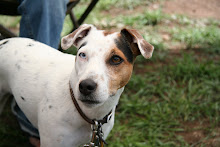Monday, February 14, 2011
Pedigree dogs-many health problems are genetic, despite what some say.
A short video well worth watching if you are not familiar with the problems associated with breed standards and the inbreeding allowed and even encouraged by the large kennel clubs. Unfortunately, many breeders do not understand these problems well enough either and often blame (often with the encouragement of holistic vets) vaccines, ill defined "toxins", commercial dog food, and sometimes the owners for problems that quite clearly have strong genetic components, even when not entirely genetic diseases. These problems have not really received enough attention from organized and science and evidence-based veterinarians, but the alternative and integrative veterinarians seem to be exploiting them without any mention of the responsibility the kennel clubs and breeders hold for creating so many health problems in the first place.
Sunday, February 13, 2011
Nonsense On Stilts by Massimo Pigliucci
Nonsense on Stilts, Massimos Pigliucci's most recent book is and interesting read for anyone interested in distinguishing science from pseudoscience, or from "bunk". The author also discusses the book on the Rationally Speaking podcast, produced by the New York City Skeptics.
While the book does not directly address CAM, it is an interesting and detailed look at the development of science from an historical and philosophical viewpoint that provides a lot of insight into what makes a subject or field scientific, proto-scientific, or just plain nonsense. It includes interesting discussions of what the differences and similarities are between different fields of science (physics and biology, for example) and how something like SETI may not be currently considered science due to it's lack of evidence, but could become scientific if such evidence is found. Some types of alternative medicine clearly fit into the bunk category (homeopathy, reflexology, Reiki, traditional chinese acupuncture) due to the lack of evidence for effectiveness and the complete lack of plausible mechanisms for action. Other things such as herbal medicine can be scientific or not depending on how they are approached by the people pursuing them.
The book is well worth reading for anyone interested in a deeper understanding of how science can be understood as a process practiced by humans, and how it has developed over time. It will give you a better understanding of what science is and how to evaluate claims about different topics.
While the book does not directly address CAM, it is an interesting and detailed look at the development of science from an historical and philosophical viewpoint that provides a lot of insight into what makes a subject or field scientific, proto-scientific, or just plain nonsense. It includes interesting discussions of what the differences and similarities are between different fields of science (physics and biology, for example) and how something like SETI may not be currently considered science due to it's lack of evidence, but could become scientific if such evidence is found. Some types of alternative medicine clearly fit into the bunk category (homeopathy, reflexology, Reiki, traditional chinese acupuncture) due to the lack of evidence for effectiveness and the complete lack of plausible mechanisms for action. Other things such as herbal medicine can be scientific or not depending on how they are approached by the people pursuing them.
The book is well worth reading for anyone interested in a deeper understanding of how science can be understood as a process practiced by humans, and how it has developed over time. It will give you a better understanding of what science is and how to evaluate claims about different topics.
Subscribe to:
Comments (Atom)





